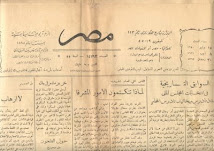 Egypt took a small but important step towards freedom of belief and equal rights yesterday when a court ruled that the "religion" section on national identity cards can be left blank.
Egypt took a small but important step towards freedom of belief and equal rights yesterday when a court ruled that the "religion" section on national identity cards can be left blank.In 1995 the Egyptian government began introducing computerised ID cards which forced everyone to identify themselves as belonging to one of the three "heavenly" religions: Islam, Christianity or Judaism. Cards could not be issued to anyone who refused to accept this, with the result that they effectively became non-citizens, unable to work legally, study beyond secondary school, vote, operate a bank account, obtain a driver's licence, buy and sell property, collect a pension, or travel.
The practice of restricting religion on ID cards to three officially approved choices had no basis in Egyptian law but was derived from the interior ministry's own (possibly erroneous) interpretation of Islamic teaching. It was challenged in the courts by several members of the Baha'i faith, which is thought to have around 2,000 followers in Egypt.
The Baha'i originated in Iran during the 19th century and by the early 20th century also had a flourishing community in Egypt.
Although the Baha'i faith is often regarded as a heretical offshoot of Islam, the Egyptian community was initially tolerated, but its position worsened in the 1950s – partly because of its accidental connections with Israel. In 1868, after being banished from his native Persia, the founder of the faith, Baha'u'llah, was exiled with his family and a small band of followers to the Turkish penal colony of Acre. As a result of this, the faith's international headquarters was established in the Acre/Haifa area, which later became part of Israel.
In the 1960s, President Nasser issued a decree which, in effect, withdrew state recognition from the Baha'i community and confiscated their property. Nasser's decree was reaffirmed by the supreme court in 1975 in a ruling which said that only the three "revealed" religions were protected by the constitution: the Baha'is were entitled to their beliefs but practice of the Baha'i faith was a "threat to public order" and therefore fell outside the constitutional protection for freedom of religion.
Yesterday's victory by the Baha'is in the supreme administrative court appears to mark the end of a five-year battle over the ID cards, since there is no route for further appeals by the Islamist lawyers who have been fighting them since the government dropped out.
"The significance of [yesterday's] decision goes far beyond the direct remedy it provides for hundreds of Baha'i Egyptians who have been the immediate victims of this arbitrary and discriminatory government policy," said Hossam Bahgat, executive director of the Egyptian Initiative for Personal Rights. "This final ruling is a major victory for all Egyptians fighting for a state where all citizens must enjoy equal rights regardless of their religion or belief."
Even so, there are likely to be continuing problems for Egyptian Christians, some of whom are recorded as Muslims on their ID cards against their will, while others try unsuccessfully to change their card after converting from Islam to Christianity. Officials often refuse on the grounds that the state cannot condone "apostasy".
Egypt is not alone in recording religion on ID cards – many countries do it, though it is an unnecessary invasion of privacy. It can also lead to discrimination when the holder is required to show it and in civil conflicts – Lebanon and Iraq, for example – it can put lives at risk.
As a United Nations special rapporteur noted in 2004:
The mention of religion on an identity card is a controversial issue and appears to be somewhat at variance with the freedom of religion or belief that is internationally recognised and protected. Moreover, even supposing that it was acceptable to mention religion on an identity card, it could only be claimed that the practice had any legitimacy whatsoever if it was non-discriminatory: to exclude any mention of religions other than Islam, Christianity or Judaism would appear to be a violation of international law.
Nine years ago, Greece had to remove religion from its ID cards to comply with EU rules on separation between church and state.
In Lebanon last month the interior minister issued a directive allowing citizens to have any reference to their religion removed from ID cards or civil registry records. Before that, everyone had been compelled to declare their allegiance to one of the 18 recognised faiths in Lebanon – contrary to the official policy of trying to eliminate sectarianism after the civil war.
Nadim Houry, a senior researcher for Human Rights Watch, who is based in Lebanon, said:
This is a step in the right direction, but the government needs to take the next step and ensure that all Lebanese can have access to personal status laws that are not religiously based and provide for equal treatment. Otherwise all Lebanese will continue to be forced to be officially members of specific religions and subject to their laws on key issues like marriage and inheritance.












No comments:
Post a Comment